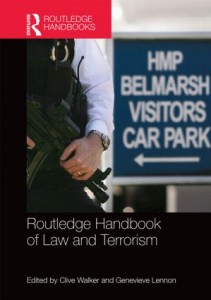By Prof Steven Greer, Professor of Human Rights (University of Bristol Law School).
 S Greer, ‘The myth of the “securitized Muslim community”: the social impact of post-9/11 counterterrorist law and policy in the west’ in G Lennon & C Walker (eds), Routledge Handbook of Law and Terrorism (London: Routledge, 2015), 400-15.
S Greer, ‘The myth of the “securitized Muslim community”: the social impact of post-9/11 counterterrorist law and policy in the west’ in G Lennon & C Walker (eds), Routledge Handbook of Law and Terrorism (London: Routledge, 2015), 400-15.
The academic literature broadly concerned with the ‘social impact’ of post-9/11 terrorism and counter-terrorism in the West is dominated by ‘the securitization thesis’ at least eight senses of which can be distinguished: 1. Muslims as a whole feel under suspicion from society merely because they are Muslim; 2. Muslims as a whole are under suspicion from society for the same reason; 3. Islam is under suspicion from society; 4. Muslims as a whole feel under suspicion from the state solely on account of being Muslim; 5. Muslims as a whole are under suspicion from the state merely because they are Muslim; 6. Islam is under suspicion from the state; 7. Muslims as a whole are subject to special security and criminal justice measures purely because they are Muslim; 8. Islam is subject to special security and criminal justice measures not applicable to other faiths or ideologies. There can be little doubt that the first four propositions are true at least to some extent. But these are not genuine instances of ‘securitization’ because this term can only credibly refer to objective, deliberate, state-managed processes, not reducible to the subjective experiences of those who may or may not have been affected by them, or to social processes over which the state may have little or no control.
This chapter seeks to demonstrate that, in the genuine fifth to eighth senses, the securitization thesis is a myth, particularly in the UK with which most of the literature is concerned. It also offers a more credible alternative based on reflexive social and political theory. Four particular difficulties with the securitization perspective stand out amongst many others. First, instead of sharp critical engagement with core assumptions, concepts, counter-theses and compelling critiques, we find confusion, muddle, and unreflective, taken-for-granted ‘group-think’. There is, in particular, a chronic failure to distinguish securitization in the strict sense, from anti-Muslim and anti-Islamic prejudice in society at large, and from the sense that some Muslims have that they are under suspicion from state and society merely because they are Muslim. Second, even in the strict sense, the securitization thesis presents an astonishingly crude, Manichean, one-dimensional, static, uni-directional, essentialist, reductionist, self-contradictory, and misleading analysis. There is, third, no credible evidence to support it and a great deal against it. Even a cursory, open-minded, review of relevant data indicates that the reality is massively more complex, fluid, multi-faceted, and uneven. Finally, exponents of the securitization perspective consistently fail to address the two central policy questions it raises: what kind of law and policy is now required to ‘de-securitize the Muslim community’ in Western states and, given that any serious law enforcement initiative against jihadi terrorism must necessarily focus disproportionately upon Muslims, since only Muslims are likely to be involved in it, what kind of effective counter-terrorism measures would not turn them into a securitized community?
